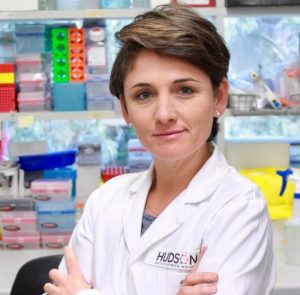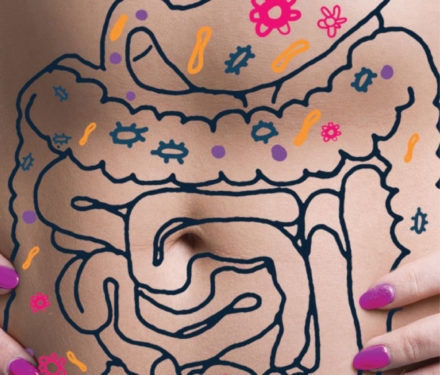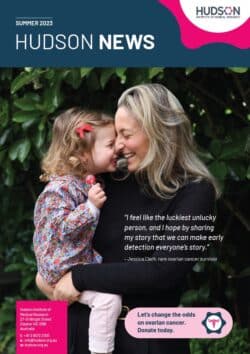Dr Jaclyn Pearson joins Hudson Institute of Medical Research
Hudson Institute welcomes postdoctoral microbiology researcher, Dr Jaclyn Pearson, who joins the Centre for Innate Immunity and Infectious Diseases as Head of the Host-Pathogen Interactions Research Group.
Dr Pearson joins the Institute from the Doherty Institute for Infection and Immunity, where she led research on pathogenic E. coli in the laboratory of Hudson Institute’s new Director and CEO, Professor Elizabeth Hartland.
A microbiologist by training, Jaclyn’s work for the past seven years has been uncovering how bugs like pathogenic E. coli hide and survive in the gut, an area that has also seen her specialise in cell biology and immunology.
“My work focuses on learning how these bacteria manipulate inflammation and cell death processes to survive inside the gut,” Dr Pearson, a National Health and Medical Research Council (NHMRC) Peter Doherty Early Career Research Fellow, explained.
In a breakthrough Nature paper published in 2013, Dr Pearson revealed how E. coli bacteria shut down the body’s immune signalling responses to infection and ‘hide’ from the innate immune system.
Dr Pearson says she’s excited to start collaborating with scientists, particularly leading immunologists, at the Hudson Institute.
“I’ll bring the disease knowledge in microbiology, and combining it with these areas of expertise in immunology and disease processes will make for some exciting, interdisciplinary science,” she said.
“I’m excited for fresh faces and a fresh environment at the Hudson Institute and Monash University. There’s a lot of great feeling and momentum, the Institute has an excellent reputation and a bright future ahead of it,” she said.
A new hypothesis
At Hudson Institute, she will use her expertise in cell death signaling and bacterial pathogenesis to understand how Salmonella survive and cause infection in humans and animals. She will also investigate interactions between viral and bacterial infections in the gut and assess the implications of this, particularly in young children.
“My new focus is going to be taking that knowledge on E. coli and focusing on bugs we don’t know as much about – including Salmonella,” Dr Pearson said.
“Sometimes you can have a viral and a bacterial infection in your gut at the same time – but there is little scientific literature in this area. My hypothesis is that they could potentially help each other to make infections much worse.”
Background and awards
Dr Pearson completed her PhD research in the Department of Microbiology and Immunology at the University of Melbourne in 2013.
In 2014, Dr Pearson was the recipient of the Premier’s Award for Health and Medical Research. In the same year she was a finalist for the Australian Museum Eureka Prize in Infectious Diseases Research and a recipient of the University of Melbourne Early Career Researcher Grant Scheme.
She was the recipient of the inaugural Australian Society for Microbiology’s Jim Pittard Early Career Researcher Award (2016) and the Victoria Fellowship (2010).
Dr Pearson is an active member of local and national networks and committees that support the professional development of early and mid-career researchers and has had numerous invitations to deliver motivational talks to students and early career researchers.
Contact us
Hudson Institute communications
t: + 61 3 8572 2697
e: communications@hudson.org.au




